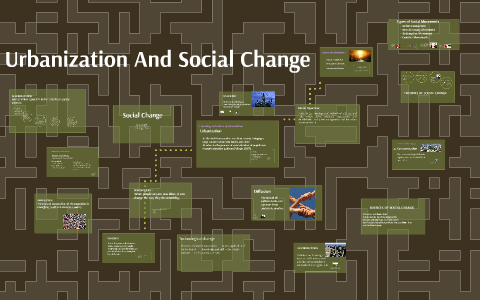Urbanization, the process of population concentration in urban areas, profoundly impacts social dynamics, economic growth, and environmental sustainability. As more people move to cities, urbanization brings both opportunities and challenges for social development. This article explores the implications of urbanization on social change and strategies to address urban challenges.

Understanding Urbanization
What Is Urbanization?
Urbanization refers to the increasing proportion of people living in urban areas compared to rural areas. It involves the growth of cities and metropolitan regions due to migration from rural areas, natural population growth, and economic development.
Importance of Urbanization
Urbanization drives economic growth, innovation, and cultural exchange. Cities serve as hubs for commerce, education, healthcare, and cultural activities, offering opportunities for employment, education, and social mobility.
Impacts of Urbanization on Social Development
Social Diversity and Integration
Cities are melting pots of diversity, bringing together people of different backgrounds, cultures, and socioeconomic statuses. Urban environments promote social interactions, cultural exchanges, and the formation of diverse communities.
Challenges of Social Inequality
Despite opportunities, urbanization often exacerbates social inequality. Cities may experience disparities in access to housing, healthcare, education, and employment opportunities, leading to social exclusion and marginalization.
Infrastructure and Public Services
Managing urban growth requires robust infrastructure and efficient public services. Adequate transportation, sanitation, healthcare facilities, and educational institutions are essential for ensuring quality of life and promoting social well-being.
Strategies for Sustainable Urban Development
Urban Planning and Design
Effective urban planning and design promote sustainable development by optimizing land use, reducing congestion, and enhancing accessibility. Designing walkable neighborhoods, green spaces, and mixed-use developments improve quality of life and environmental sustainability.
Affordable Housing and Inclusive Communities
Ensuring access to affordable housing and creating inclusive communities are critical for reducing social inequality. Policies that promote mixed-income housing, affordable rental options, and community development initiatives foster social cohesion and economic diversity.
Sustainable Transportation and Infrastructure
Investing in sustainable transportation systems, such as public transit, cycling infrastructure, and pedestrian-friendly streets, reduces congestion, air pollution, and carbon emissions. Integrated infrastructure planning improves mobility and accessibility for all residents.
Case Studies of Urbanization and Social Change
Curitiba, Brazil: Sustainable Urban Planning
Curitiba is renowned for its innovative urban planning strategies, including bus rapid transit (BRT) systems, green spaces, and pedestrian-friendly streets. These initiatives have improved mobility, reduced traffic congestion, and enhanced quality of life for residents.
Tokyo, Japan: Aging Population Challenges
Tokyo faces challenges associated with an aging population, including healthcare services, elder care facilities, and social isolation among seniors. The city’s response involves integrating age-friendly policies, community support networks, and accessible urban design.
Challenges in Urbanization and Social Development
Urban Poverty and Homelessness
Urbanization often concentrates poverty and homelessness in cities, presenting challenges for social welfare systems and community support services. Addressing these issues requires comprehensive strategies that provide housing, healthcare, and economic opportunities for vulnerable populations.
Environmental Sustainability
Rapid urbanization can strain natural resources, contribute to pollution, and exacerbate climate change. Promoting sustainable practices, such as green building standards, renewable energy initiatives, and waste management programs, is essential for urban resilience and environmental stewardship.
Conclusion
Urbanization transforms societies by concentrating populations, fostering economic growth, and promoting cultural exchange. Managing urbanization effectively requires addressing social inequalities, enhancing infrastructure, and promoting sustainable development. By adopting inclusive policies and sustainable practices, cities can harness the opportunities of urbanization to create equitable and resilient communities.



